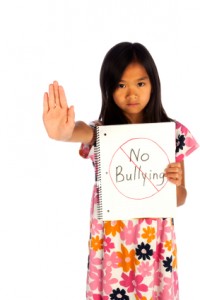They say schools are no longer in the business of teaching good citizenship, character, ethics or whatever you want to call it because educators are too busy “teaching to the test.” There’s no test for character that can be graded to give districts bragging rights for getting their scores up, so why teach this stuff? Because there actually is a test for character. It’s called Life and we ought to be teaching to it. When we don’t, we get this…
Hey Terra,
People at school don’t like me because me and this popular girl got into a little fight and I won. To get even she spread rumours about me saying I was in a mental institution for weird and violent behavior (a complete lie). Then everyone started to insult and ignore me. She does it the most. They say stuff like “Hey freak! No one likes you, so why dont you take a long walk off a short bridge?” Everyday. I don’t get a break from it. I insult them back. I know I probably shouldn’t bother, but it’s really hard not to. It’s like automatic for me now. I don’ t like being told to basically die. It’s not right for anyone to be told that.
So Fed Up
Dear Fed Up,
These kids are being rude and cruel. I know it’s hard to hear this crap and try to brush it off. I’ve heard it said that no one can bring you down without your permission. That’s kinda true and kinda not. Humans are wired to be emotional. We’re also wired to want other people to like us. So when someone shouts angry words in your face or online, your human wiring kicks in. Your heart beats faster (and not in a good way) and you feel attacked. Even if the person isn’t someone you know or care about. Even if what he or she says is a lie. Words hurt. We feel it. So I totally understand the temptation to attack back. Except… it doesn’t help. You’ve seen that. It just makes things worse. Like throwing gasoline on a fire. That won’t put it out.
a) you don’t give anyone permission to push your buttons so you automatically react like a puppet and
b) at least one adult at school and/or at home steps in and gets to the bottom of this so that this girl and her followers no longer feel they’ve got the right to talk to you or anyone in this way.
I just took my fingers off the keyboard for a minute. I’m taking a deep breath now, because hearing about this stuff every day really upsets me. I feel frustrated there are kids who believe it’s OK to be mean to other kids. I also feel frustrated that the adults who run schools (principals, counselors, teachers, coaches) have not done a better job making school a safer more accepting place for all students all the time.
Take care.
In friendship,
Terra
————–
I’m so sick of the situations that prompt these emails. Where are the adults in charge? Do they really not know what’s going on? Do they believe it’s not part of their “job” to get involved with fights between students? Do they worry they’ll get no support from their administrators if they step in? Do they worry they’ll get in trouble with parents for calling out kids who are disrepecting other kids? Or have they just given up, believing that peer harassment is a problem bigger than any remedy they might offer in the moment?
I don’t know what school administrators and teachers think about the bullying that persists in their schools. Why don’t you tell me? I’m listening.















